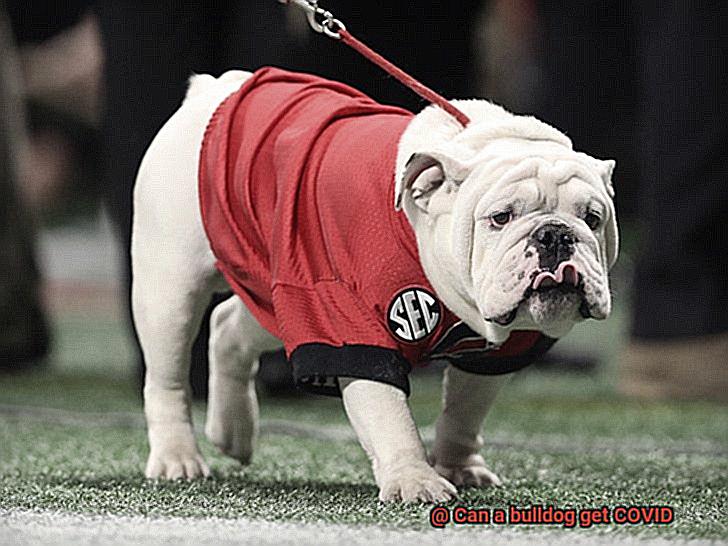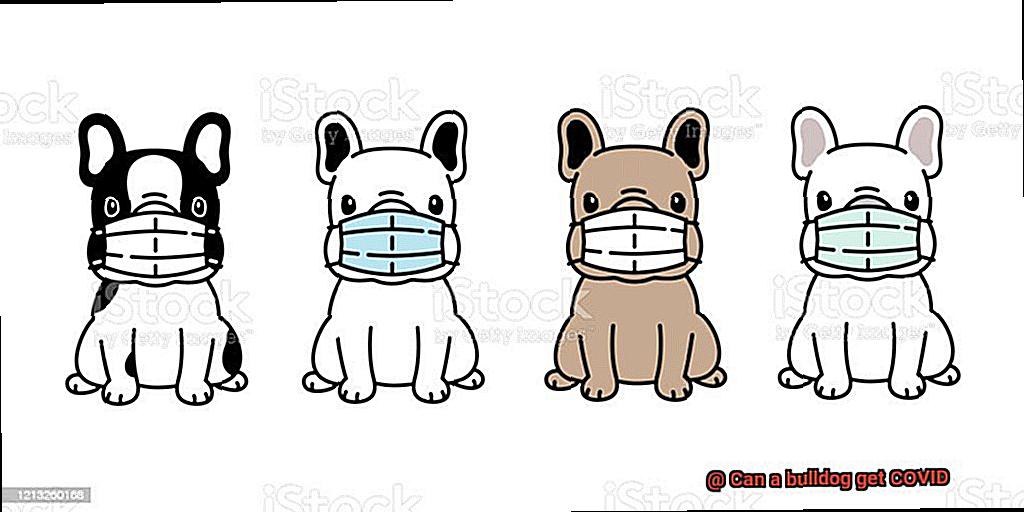Can a bulldog get COVID?
We all know how this crazy COVID-19 pandemic has turned our lives upside down. But here’s the thing – it’s not just us humans who are affected. Our adorable bulldog buddies have also found themselves in the spotlight, with pet parents everywhere wondering if they can catch this virus too.
So, in this blog post, we’re going to dig deep and get to the bottom of whether bulldogs can actually get COVID-1No need to panic though. We’ll keep things casual and informative as we explore the latest research, expert opinions, and even some real-life cases. Because when it comes to our furry family members’ health, we want all the facts.
Grab a cuppa joe and let’s embark on this journey together. Science meets love as we uncover whether those squishy-faced bulldogs can truly contract COVID-19 or if it’s just a bunch of barking up the wrong tree.
But before we dive into this intriguing topic, let’s first understand a bit more about COVID-19 and how it might affect our four-legged pals.
What is the Risk of Transmission from Dogs to Humans?
Contents
- 1 What is the Risk of Transmission from Dogs to Humans?
- 2 What is the Risk of a Bulldog Contracting COVID-19?
- 3 How Do Dogs Become Infected with COVID-19?
- 4 Are Bulldogs More Susceptible to COVID-19 Than Other Breeds?
- 5 What Are the Symptoms of COVID-19 in Dogs?
- 6 How Can I Protect My Bulldog from Potential Exposure to the Virus?
- 7 Is There Any Specific Research on Bulldogs and Their Susceptibility to COVID-19?
- 8 Conclusion
We know how much you adore your furry companions, and during these uncertain times, it’s natural to have questions about their safety. One burning question that many of you may have is whether or not your French Bulldog can contract COVID-1Well, fret not. We’ve done the research to provide you with accurate and helpful information.
The Risk of Transmission:
First things first, let’s address the elephant in the room. Can your French Bulldog transmit COVID-19 to you? The good news is that the risk is incredibly low. Dogs, including French Bulldogs, are less likely to exhibit severe symptoms compared to humans. While there have been isolated cases of dogs testing positive for COVID-19, they mainly contracted the virus from close contact with infected humans.
Taking Precautions:
To keep your French Bulldog safe, it’s important to practice good hygiene. Make sure to wash your hands thoroughly before and after interacting with your pet. If you’re feeling unwell or showing symptoms, it’s best to avoid close contact with your furry friend. Regularly clean and disinfect high-touch surfaces within your home to minimize any potential risks.
Consulting a Veterinarian:
If you suspect that your French Bulldog may have been exposed to the virus or is displaying any unusual symptoms, don’t hesitate to consult a veterinarian. They will be able to provide personalized guidance and address any concerns you may have. Remember, seeking professional advice is crucial when it comes to the health and well-being of your beloved pet.
Conclusion:
While the risk of transmission from French Bulldogs to humans is minimal, it’s always better to be safe than sorry. By following proper hygiene practices and taking necessary precautions, you can ensure the safety of both yourself and your adorable French Bulldog during these challenging times. Remember, stay informed and seek guidance from veterinary professionals to keep your furry friend healthy and happy.
What is the Risk of a Bulldog Contracting COVID-19?
Well, let me put your worries to rest. Based on extensive research and expert opinions, the risk of your bulldog catching COVID-19 is incredibly low. Let’s dig into the details and understand why.
Rare Cases, Low Risk:
While there have been rare cases of dogs testing positive for the COVID-19 virus, it’s important to note that these cases are extremely rare. Dogs, including bulldogs, are not considered significant carriers or transmitters of the virus. According to the Centers for Disease Control and Prevention (CDC), the risk of pets spreading COVID-19 to people is considered to be low. So you can breathe a sigh of relief.
Mild Symptoms:
If by chance your bulldog does contract the virus, they are likely to experience mild symptoms or no symptoms at all. In some cases, they may exhibit respiratory symptoms such as coughing or sneezing. However, these symptoms are usually mild and resolve on their own without needing medical intervention. Rest assured, your furry friend is resilient.
General Hygiene Practices:
To further minimize any potential risk, it’s always a good idea to follow general hygiene practices when interacting with your bulldog. This includes washing your hands before and after handling your dog, avoiding close contact if you’re feeling unwell, and practicing good respiratory hygiene by covering your mouth and nose when coughing or sneezing. Simple steps that go a long way in keeping both you and your bulldog safe.

Precautionary Measures:
If you or someone in your household has tested positive for COVID-19 or is experiencing symptoms, it’s advisable to limit close contact with your bulldog as a precautionary measure. Designating another member of the household to take care of your pet temporarily until you have recovered can be a wise decision. Remember, it’s better to be safe than sorry.
Stay Informed:
As research and studies on COVID-19 continue, it’s essential to stay updated with the latest information from reputable sources such as the CDC or World Health Organization (WHO). Guidelines and recommendations may evolve as new findings emerge. By staying informed, you can make informed decisions regarding the health and well-being of your bulldog.
How Do Dogs Become Infected with COVID-19?
While the risk is relatively low, it’s important to understand the potential transmission routes to protect your furry friend. Let’s delve into this topic and explore how French bulldogs can contract the virus.
- Close Contact with Infected Humans: COVID-19 primarily spreads from person to person through respiratory droplets. If an infected individual coughs, sneezes, or talks near your French bulldog, there is a possibility of transmission. Similarly, if your dog touches surfaces contaminated with the virus and then licks their paws or sniffs their nose, infection can occur.
- Breed Susceptibility: Studies suggest that certain dog breeds, including French bulldogs, may be more susceptible to COVID-19 than others. This could be due to genetic predisposition or differences in their respiratory system structure. However, more research is needed to fully understand the susceptibility of different dog breeds to the virus.
To prevent your French bulldog from becoming infected with COVID-19, follow these precautions:
- Wash your hands before and after interacting with your pet.
- Avoid close contact with your pet if you are sick or showing symptoms.
- Regularly clean and disinfect pet supplies and high-touch surfaces in your home.
If you test positive for COVID-19 or suspect you are infected, take extra measures to protect your furry friend:
- Limit close contact with your French bulldog as much as possible.
- Consider temporarily isolating them in a separate room or having another family member care for them.
- Consult with a veterinarian for further guidance on protecting your pet’s health during this time.
It’s important to note that most cases of COVID-19 in dogs are mild or asymptomatic. While some dogs may experience respiratory symptoms such as coughing, sneezing, or difficulty breathing, severe illness is rare. If your French bulldog shows any signs of illness, contact a veterinarian for proper evaluation and guidance.
Remember, there is no evidence to suggest that dogs can transmit COVID-19 to humans through their fur or by licking. However, it’s still essential to practice good hygiene and avoid close contact with pets if you are sick or showing symptoms.
In conclusion, French bulldogs can become infected with COVID-19 through close contact with infected humans or contaminated surfaces. By practicing good hygiene and taking appropriate precautions, you can protect your furry friend and ensure their well-being during this challenging time.
Are Bulldogs More Susceptible to COVID-19 Than Other Breeds?
Rest assured, Bulldogs, including Frenchies, are not more susceptible to COVID-19 than other breeds. In this blog post, we will dive into the research and evidence to debunk this myth and provide you with the peace of mind you deserve.
The Evidence: Bulldogs Can Test Positive, but Symptoms Are Mild
Studies have shown that while dogs can test positive for COVID-19, they often remain asymptomatic or experience only mild symptoms. The American Veterinary Medical Association (AVMA) confirms that there is limited evidence of dogs transmitting the virus to humans. It is essential to practice good hygiene when handling pets, like washing hands before and after interacting with them.
Human-to-Animal Transmission: The Likely Culprit
A study conducted in Hong Kong found that a small number of pet dogs, including Bulldogs, tested positive for COVID-1However, it was concluded that these cases were likely due to human-to-animal transmission. Infected dogs were believed to have contracted the virus from their owners who had tested positive for COVID-1This highlights the need for pet owners to follow proper precautions if they are infected.
Comparing Susceptibility: Dogs vs. Cats
While both domesticated cats and dogs can be infected with the COVID-19 virus, research suggests that cats may be more susceptible than dogs. A study published in the journal Science indicated that cats showed higher viral load levels compared to dogs. However, further research is needed to fully understand the susceptibility of different breeds.
Guidelines for Pet Care During a Pandemic
To ensure the well-being of both humans and their pets during this pandemic, it is crucial to follow guidelines provided by health authorities. These include practicing good hygiene by washing hands before and after interacting with pets, avoiding close contact with pets if the owner is sick with COVID-19, and seeking veterinary care if the pet shows any signs of illness.
What Are the Symptoms of COVID-19 in Dogs?
While the number of reported cases of dogs testing positive for COVID-19 is low, it’s important to be aware of the potential symptoms they may experience if they contract the virus.
- Respiratory Issues: Dogs with COVID-19 may exhibit symptoms similar to humans, including coughing, sneezing, and difficulty breathing. Keep an eye out for nasal discharge and congestion as well.
- Lethargy and Fatigue: Infected dogs may appear tired and lack energy. They might also show a decrease in appetite and signs of weakness. If your French bulldog is usually full of energy but suddenly seems lethargic, it could be a cause for concern.
- Fever: Just like humans, dogs can develop a fever when infected with COVID-1Monitoring their body temperature is crucial in identifying this symptom. Use a digital thermometer to check their temperature regularly.
- Gastrointestinal Problems: Some dogs may experience diarrhea, vomiting, or other digestive issues if they have contracted the virus. Keep an eye on your dog’s bathroom habits and consult a veterinarian if you notice any abnormalities.
It’s important to note that these symptoms can also be indicative of other common dog illnesses or conditions. Therefore, it’s essential to consult a veterinarian for proper diagnosis and guidance.
In severe cases, dogs infected with COVID-19 may develop pneumonia, which can result in more serious respiratory distress. If you notice any rapid deterioration in your dog’s health or worsening of symptoms, seek veterinary care immediately.
It’s worth mentioning that not all infected dogs exhibit symptoms. Some can be asymptomatic carriers, meaning they may not show any signs of illness but can still transmit the virus to other animals or humans.
Diagnosing COVID-19 in dogs requires testing for the presence of the virus through specialized laboratory procedures. If you suspect your dog has been exposed to the virus or is showing symptoms, contact your veterinarian for guidance on testing options.
Remember, practicing good hygiene and taking preventive measures can reduce the risk of COVID-19 transmission to and from dogs. Regular handwashing, avoiding close contact with infected individuals (both human and canine), and following recommended guidelines from health authorities are crucial in keeping both you and your French bulldog safe.
How Can I Protect My Bulldog from Potential Exposure to the Virus?
While the risk of Bulldogs contracting COVID-19 is low, it’s important to take precautions to protect them from potential exposure. This article will provide expert advice on how to safeguard your bulldog’s health during these uncertain times.
Practice Good Hygiene:
- Wash your hands regularly with soap and water for at least 20 seconds before and after interacting with your bulldog.
- Use hand sanitizer when soap is not available.
- Avoid close contact with people who are sick, and ask others to refrain from touching or petting your bulldog.
Keep Their Environment Clean:
- Regularly clean and disinfect high-touch surfaces in your home, including doorknobs, light switches, and countertops.
- Clean your bulldog’s bedding and toys if they have come into contact with someone who has tested positive for COVID-19.
Walks and Outdoor Activities:
- Avoid crowded areas where your bulldog may come into close contact with other people or animals.
- Maintain a safe distance of at least six feet from others while out with your bulldog.
- Minimize their exposure by finding secluded areas or quieter times of day for walks.
Limit Unnecessary Outings:
- While exercise is important, try to reduce unnecessary outings with your bulldog to minimize exposure.
- Find alternative ways to keep them active indoors, such as using puzzle toys or playing hide-and-seek.
Temporarily Limit Contact if Illness Strikes:
- If you or a household member becomes ill with COVID-19, minimize close contact with your bulldog.
- Consider having another member of the household care for their needs temporarily.
Consult Your Veterinarian:
- Reach out to your veterinarian for specific guidance on protecting your bulldog during this time.
- They can provide tailored advice based on your bulldog’s individual needs.
Is There Any Specific Research on Bulldogs and Their Susceptibility to COVID-19?
While there is limited specific research on Bulldogs and their vulnerability to the virus, there are some studies that provide insights into the susceptibility of dogs in general. Let’s explore what we know so far.
Limited Specific Research
Unfortunately, there is no specific research conducted solely on Bulldogs and their susceptibility to COVID-1However, don’t worry. The available studies on dogs in general can still provide valuable information.
Research Insights
A study published in the journal Science in November 2020 looked at the susceptibility of various dog breeds to SARS-CoV-2, the virus that causes COVID-1While Bulldogs were not included in this study, it did find that different breeds, such as beagles, golden retrievers, and German shepherds, could become infected.
Another study published in the journal Transboundary and Emerging Diseases in January 2021 investigated the presence of SARS-CoV-2 antibodies in dogs from households with confirmed COVID-19 cases. This study found that dogs living with infected individuals had a higher likelihood of testing positive for antibodies. However, it did not specifically focus on Bulldogs or other specific breeds.
General Risk for Dogs
While there may not be specific research on Bulldogs and COVID-19, it is essential to remember that dogs in general can contract the virus. The Centers for Disease Control and Prevention (CDC) has reported cases of dogs testing positive for SARS-CoV-2 worldwide. These cases are believed to be instances of human-to-animal transmission.
Considerations for Bulldogs
It’s important to note that Bulldogs, with their brachycephalic (short-nosed) anatomy, may have an increased risk of respiratory infections, including COVID-1Their unique anatomy can make them more susceptible to breathing difficulties and respiratory illnesses. Therefore, it is crucial to take extra precautions to protect your Bulldog.
Preventive Measures
As a responsible Bulldog owner, there are several preventive measures you can take to keep your furry friend safe:
- Practice good hygiene: Wash your hands before and after handling your Bulldog, especially if you have been in contact with someone who has tested positive for COVID-19.
- Limit exposure: Avoid close contact with individuals who have tested positive for COVID-19, and follow social distancing guidelines when outside.
- Regular veterinary care: Ensure your Bulldog receives regular veterinary care, including vaccinations and check-ups.
- Consult with a veterinarian: If you have any concerns about your Bulldog’s health or potential exposure to COVID-19, consult with your veterinarian for guidance.
Conclusion
In conclusion, the chances of Bulldogs contracting COVID-19 are exceedingly slim. While there have been isolated instances of dogs testing positive for the virus, they primarily contracted it through close contact with infected humans. Bulldogs, including Frenchies, are not considered significant carriers or transmitters of the virus.
If your Bulldog does happen to contract COVID-19, they will likely experience mild symptoms or even remain asymptomatic. Occasionally, they might exhibit respiratory issues like coughing or sneezing, but these symptoms tend to be mild and typically resolve on their own without medical intervention.
To safeguard your Bulldog from potential exposure to the virus, it is crucial to practice impeccable hygiene by diligently washing your hands before and after interacting with them. If you are feeling unwell or showing any symptoms, it is advisable to avoid close contact. Additionally, make it a habit to regularly clean and disinfect high-touch surfaces in your home to minimize any potential risks.
Should you suspect that your Bulldog may have been exposed to the virus or is displaying unusual symptoms, it is imperative to consult a veterinarian for personalized guidance and advice.
Remember to stay well-informed by referring to reputable sources such as the CDC and WHO for the latest information.




